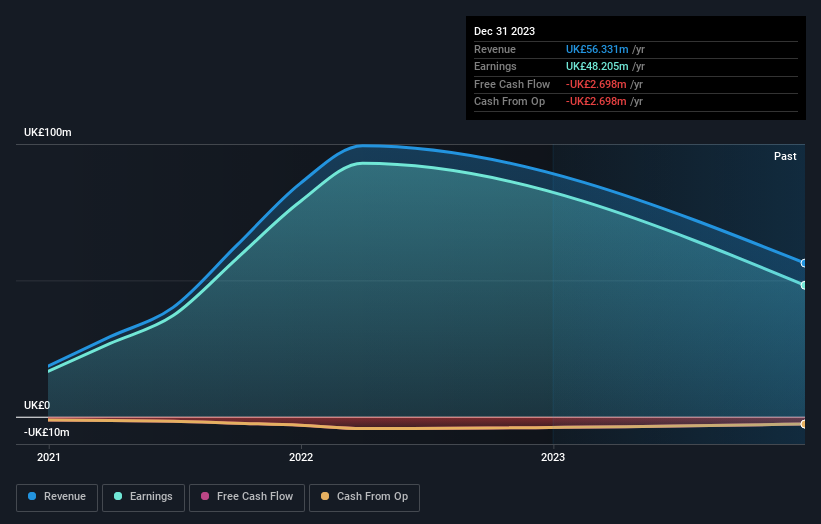With 64% ownership, Literacy Capital plc (LON:BOOK) insiders have a lot at stake
Key Insights
Significant insider control over Literacy Capital implies vested interests in company growth
53% of the business is held by the top 4 shareholders
If you want to know who really controls Literacy Capital plc (LON:BOOK), then you'll have to look at the makeup of its share registry. We can see that individual insiders own the lion's share in the company with 64% ownership. Put another way, the group faces the maximum upside potential (or downside risk).
So, insiders of Literacy Capital have a lot at stake and every decision they make on the company’s future is important to them from a financial point of view.
Let's delve deeper into each type of owner of Literacy Capital, beginning with the chart below.
See our latest analysis for Literacy Capital
What Does The Institutional Ownership Tell Us About Literacy Capital?
Institutions typically measure themselves against a benchmark when reporting to their own investors, so they often become more enthusiastic about a stock once it's included in a major index. We would expect most companies to have some institutions on the register, especially if they are growing.
Literacy Capital already has institutions on the share registry. Indeed, they own a respectable stake in the company. This can indicate that the company has a certain degree of credibility in the investment community. However, it is best to be wary of relying on the supposed validation that comes with institutional investors. They too, get it wrong sometimes. It is not uncommon to see a big share price drop if two large institutional investors try to sell out of a stock at the same time. So it is worth checking the past earnings trajectory of Literacy Capital, (below). Of course, keep in mind that there are other factors to consider, too.
Literacy Capital is not owned by hedge funds. From our data, we infer that the largest shareholder is Paul R. Pindar (who also holds the title of Top Key Executive) with 28% of shares outstanding. Its usually considered a good sign when insiders own a significant number of shares in the company, and in this case, we're glad to see a company insider play the role of a key stakeholder. In comparison, the second and third largest shareholders hold about 11% and 8.2% of the stock. Interestingly, the second-largest shareholder, Richard Pindar is also Chief Executive Officer, again, pointing towards strong insider ownership amongst the company's top shareholders.
To make our study more interesting, we found that the top 4 shareholders control more than half of the company which implies that this group has considerable sway over the company's decision-making.
Researching institutional ownership is a good way to gauge and filter a stock's expected performance. The same can be achieved by studying analyst sentiments. We're not picking up on any analyst coverage of the stock at the moment, so the company is unlikely to be widely held.
Insider Ownership Of Literacy Capital
The definition of an insider can differ slightly between different countries, but members of the board of directors always count. Company management run the business, but the CEO will answer to the board, even if he or she is a member of it.
I generally consider insider ownership to be a good thing. However, on some occasions it makes it more difficult for other shareholders to hold the board accountable for decisions.
Our most recent data indicates that insiders own the majority of Literacy Capital plc. This means they can collectively make decisions for the company. Given it has a market cap of UK£289m, that means they have UK£185m worth of shares. Most would be pleased to see the board is investing alongside them. You may wish todiscover (for free) if they have been buying or selling.
General Public Ownership
The general public-- including retail investors -- own 11% stake in the company, and hence can't easily be ignored. This size of ownership, while considerable, may not be enough to change company policy if the decision is not in sync with other large shareholders.
Private Company Ownership
It seems that Private Companies own 3.5%, of the Literacy Capital stock. It might be worth looking deeper into this. If related parties, such as insiders, have an interest in one of these private companies, that should be disclosed in the annual report. Private companies may also have a strategic interest in the company.
Next Steps:
I find it very interesting to look at who exactly owns a company. But to truly gain insight, we need to consider other information, too.
I like to dive deeper into how a company has performed in the past. You can access this interactive graph of past earnings, revenue and cash flow, for free.
Of course this may not be the best stock to buy. So take a peek at this free free list of interesting companies.
NB: Figures in this article are calculated using data from the last twelve months, which refer to the 12-month period ending on the last date of the month the financial statement is dated. This may not be consistent with full year annual report figures.
Have feedback on this article? Concerned about the content? Get in touch with us directly. Alternatively, email editorial-team (at) simplywallst.com.
This article by Simply Wall St is general in nature. We provide commentary based on historical data and analyst forecasts only using an unbiased methodology and our articles are not intended to be financial advice. It does not constitute a recommendation to buy or sell any stock, and does not take account of your objectives, or your financial situation. We aim to bring you long-term focused analysis driven by fundamental data. Note that our analysis may not factor in the latest price-sensitive company announcements or qualitative material. Simply Wall St has no position in any stocks mentioned.

 Yahoo Finance
Yahoo Finance 

